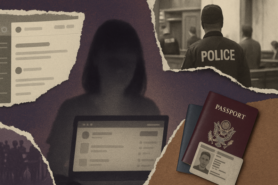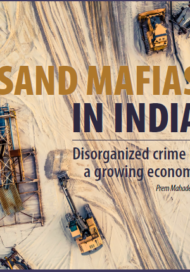The rise of global autocracy threatens liberties everywhere, undermining the very institutional principles that hold government to account in democratic societies. Across the Mekong region, governments are systematically restricting civil society through surveillance and persecution, creating a ‘closed’ civil society space in which citizens cannot freely express their opinions, access information or organize.
Civil society organizations, when empowered and free from repression, play an important role in documenting and exposing crime throughout the region, but their voices are increasingly being stifled. From sporadic campaigns of repression in Thailand to more consistent and aggressive pressure targeting independent civil society actors in Cambodia and Myanmar, ‘closed’ civil society space is becoming the norm. In Laos and Vietnam, the historical restriction of activist groups has effectively prevented a robust, independent civil society from developing in the first place. Alleged cross-border assassinations and disappearances, such as the abduction of Thai political dissidents in Laos and Cambodia, highlight the kinds of risks that activists face.
Besides direct repression, governments have also employed structural measures to prevent new civil society initiatives from forming. Whether intentionally designed or simply an outcome of broader policy neglect, opportunities for education and professional development in critical fields, such as criminology or human rights, have been restricted. This limits the development of local expertise in addressing organized crime, corruption and human rights abuses.
Rolling back freedoms
According to this year’s Freedom in the World report, global freedom has declined for the 19th consecutive year, with 80 per cent of countries and territories worldwide classified by the report as either ‘partially free’ or ‘not free’. All of the Mekong countries are once again labelled as ‘not free’.
Myanmar ranks as the most restrictive country in the region, especially since the February 2021 coup, which led to severe crackdowns on dissent, widespread displacement and renewed civil war. Thailand, by comparison, is the freest of the region’s ‘not free’ nations. Although civil society in Thailand faces substantial constraints, suppression is neither constant nor entirely predictable. Crackdowns usually occur during large protests, when powerful individuals or institutions come under criticism, social boundaries are challenged, cultural norms are defied or dominant political narratives are questioned.
In recent years, there has been an increase in the use of legal and bureaucratic methods to silence dissent across the region. These include Strategic Litigation Against Public Participation (SLAPP) suits, which are used to deter people from speaking out on important issues, and the threats of new repressive legislation, such as proposed NGO laws. The extensive use of lèse-majesté laws, which criminalize criticism of the monarchy, particularly in Thailand and Cambodia, as well as surveillance tactics targeting activists across borders, have created additional barriers to independent civil society work.
Zones of impunity
The Mekong region has numerous ‘zones of impunity’, which prevail particularly in border areas, conflict-affected territories and increasingly within special economic zones. Characterized by limited state oversight, blurred boundaries between political and business interests, and minimal accountability, these hubs of impunity create an environment in which criminality flourishes. They emerge as a result of weak governance, opaque regulatory frameworks and strategic neglect by political elites, facilitating illicit activities including drug and human trafficking, illegal logging and cyber scams.
In Myanmar, ongoing armed conflict and weak state control in border states such as Shan and Kachin have enabled organized crime groups to increase the production and trafficking of heroin and synthetic drugs, with illicit operations thriving in areas where civic monitoring is severely restricted. Organized crime is also allegedly present in junta-controlled areas of Myanmar, with military elements accused of participating in the running of scam centres and other illicit economies. Similarly, Cambodia’s special economic zones, particularly those around Sihanoukville, have reportedly become hubs for organized crime and alleged corruption due to close ties between political elites and criminal enterprises. The arrest of investigative journalist Mech Dara in September 2024, alongside the expulsion and persecution of many others, shows the scale of retaliatory repression faced by civil society actors attempting to expose illicit dealings.
The limited civic oversight in zones of impunity has not only allowed organized crime to prosper unchecked, but has also discouraged journalists, activists and whistleblowers from publicly confronting criminality, despite substantial evidence identifying some of the main actors and networks involved. The risk of arrest, prosecution, or even assassination or enforced disappearance is simply too great.
Safeguarding civic space
The importance of protecting civil society actors, particularly whistleblowers and journalists, cannot be overstated. Various mechanisms, from secure reporting channels to emergency response protocols and global advocacy networks, are essential for ensuring their safety. It is crucial that the international community speaks out when activists or journalists are persecuted for exposing corruption and organized crime, and offers safe havens to those forced to flee persecution.
Without safe civic spaces, transparent reporting mechanisms, and national and international support for courageous individuals confronting organized criminal networks, illicit economies across the Mekong region will continue to thrive, further eroding the rule of law, stability and security in communities already at risk.
«ស្ថិតក្នុងទីងងឹត»
អង្គការសង្គមស៊ីវិលក្នុងតំបន់មេគង្គកំពុងត្រូវបានបំបិទសំឡេង
ការកើនឡើងនៃការដឹកនាំបែបផ្តាច់ការនិយមបានគំរាមកំហែងសេរីភាពគ្រប់ទីកន្លែង ដែលវាធ្វើឲ្យគោលការណ៍ដឹកនាំស្ថាប័នដែលធានារដ្ឋាភិបាលមួួយដែលមានទំនួលខុសត្រូវក្នុងសង្គមប្រជាធិបតេយ្យទន់ខ្សោយ។ រដ្ឋាភិបាលប្រទេសនៅក្នុងតំបន់មេគង្គបានរឹតត្បិតអង្គការសង្គមស៊ីវិលជាប្រព័ន្ធ តាមរយៈការឃ្លាំមើល តាមដាន ការធ្វើទុក្ខបុកម្នេញ ដែលនេះធ្វើឲ្យលម្ហសេរីភាពរបស់អង្គការសង្គមស៊ិវិលលែងមាន ហើយប្រជាពលរដ្ឋមិនអាចបញ្ចេញមតិដោយសេរី ទទួលបានព័ត៌មាន និងប្រមូលផ្តុំបានឡើយ។
នៅពេលដែលអង្គការសង្គមស៊ីវិលត្រូវបានលើកស្ទួយ និងមិនរងការគាបសង្កត់ ពួកគេអាចដើរតួនាទីសំខាន់ក្នុងការកត់ត្រានិងលាតត្រដាងឧក្រិដ្ឋកម្មដែលកើតឡើងក្នុងតំបន់ ប៉ុន្តែជាក់ស្តែងសំឡេងរបស់ពួកគេត្រូវបានរឹតត្បិតកាន់តែខ្លាំង។
បើទោះយុទ្ធនាការនៃការគាបសង្កត់មិនកើតឡើងជាប់លាប់ក្នុងប្រទេសថៃ ប៉ុន្តែនៅក្នុងប្រទេសកម្ពុជា និងមីយ៉ាន់ម៉ាវិញ អង្គការសង្គមស៊ីវិលឯករាជ្យរងគំនាបយ៉ាងខ្លាំង និងជាប់លាប់។
អង្គការសង្គមស៊ីវិលក្នុងប្រទេសទាំងនោះមិនមានសេរីភាពឡើយ។ នៅក្នុងប្រទេសឡាវ និងវៀតណាម ការរឹតត្បិតជាប្រវត្តិសាស្រ្តលើសកម្មជនបានបង្អាក់អង្គការសង្គមស៊ីវិលឯករាជ្យដែលរឹងមាំពីការអភិវឌ្ឍ តាំងពីពេលចាប់ផ្តើម។
ការសម្លាប់ឆ្លងដែន និងការបាត់ខ្លួន ដោយមានការចាប់បង្ខាំងសកម្មជននយោបាយថៃក្នុងប្រទេសឡាវ និងកម្ពុជា បង្ហាញពីហានិភ័យដែលសកម្មជនកំពុងប្រឈម។
ក្រៅពីការគាបសង្កត់ដោយផ្ទាល់ រដ្ឋាភិបាលក្នុងតំបន់ក៏បានប្រើប្រាស់វិធានការជាប្រព័ន្ធ ដើម្បីបង្អាក់គំនិតផ្តួចផ្តើមថ្មីរបស់អង្គការសង្គមស៊ីវិល។
ឱកាសសម្រាប់ការអប់រំ និងការអភិវឌ្ឍវិជ្ជាជីវៈនៅក្នុងវិស័យសំខាន់ទាំងនេះ ដូចជាការសិក្សាស្វែងយល់អំពីឧក្រិដ្ឋកម្ម ឬក៏សិទ្ធិមនុស្សត្រូវបានរឹតត្បិត ដោយសារតែការគាបសង្កត់ដោយចេតនា ឬក៏ជាលទ្ធផលនៃគោលនយោបាយមិនយកចិត្តទុកដាក់លើបញ្ហាប្រឈមរបស់ពលរដ្ឋ។ នេះកំហិតការអភិវឌ្ឍជំនាញក្នុងស្រុក ដើម្បីដោះស្រាយឧក្រិដ្ឋកម្មដែលមានអង្គការចាត់តាំង អំពើពុករលួយនិងការរំលោភបំពានសិទ្ធិមនុស្ស។
ការរឹតត្បិតសេរីភាព
បើយោងតាមរបាយការណ៍សន្ទទស្សន៍សេរីភាពសម្រាប់ឆ្នាំនេះ សេរីភាពក្នុងពិភពលោកបានធ្លាក់ចុះក្នុងរយៈពេល១៩ឆ្នាំជាប់គ្នា។ ៨០%នៃប្រទេសក្នុងពិភពលោកត្រូវបានចំណាត់ថ្នាក់ថា«មានសេរីភាពដោយផ្នែក»ឬ«មិនមានសេរីភាពទាល់តែសោះ»។ ប្រទេសក្នុងតំបន់មេគង្គវិញត្រូវបានចំណាត់ថ្នាក់ថា«មិនសេរី»។
ប្រទេសមីយ៉ាន់ម៉ាត្រូវបានចំណាត់ថ្នាក់ជាប្រទេសដែលរឹតត្បិតសេរីភាពជាងគេក្នុងតំបន់ ចាប់តាំងពីរដ្ឋប្រហារកាលពីខែកុម្ភៈ ឆ្នាំ២០២១ ដែលមានការបង្រ្កាបយ៉ាងធ្ងន់ធ្ងរទៅលើក្រុមជំទាស់ ការផ្លាស់ប្តូរលំនៅដ្ឋានរបស់ពលរដ្ឋយ៉ាងច្រើន និងការកើតឡើងសង្រ្គាមស៊ីវិលសាជាថ្មី។ បើប្រៀបធៀបប្រទេសក្នុងតំបន់ដែលមិនមានសេរីភាព ថៃជាប្រទេសដែលប្រសើរជាងគេ។
បើទោះបីអង្គការសង្គមស៊ីវិលក្នុងប្រទេសថៃមានការប្រឈមច្រើន ការគាបសង្កត់មិនកើតឡើងជាបន្តបន្ទាប់ឬក៏ជាក់លាក់១០០%ឡើយ។ ជាធម្មតា គេឃើញការបង្រ្កាបកើតឡើងតែក្នុងពេលដែលមានការតវ៉ាធំៗ នៅពេលដែលបុគ្គលមានអំណាច ឬក៏ស្ថាប័នដឹកនាំរងការរិះគន់ ការតវ៉ាជំទាស់នឹងការកំហិតក្នុងសង្គម ការរឹតត្បិតវប្បធម៌ ឬក៏ការចោទជាសំណួរលើអំណាចនយោបាយ។
ក្នុងរយៈពេលប៉ុន្មានឆ្នាំចុងក្រោយនេះ មានការកើនឡើងនៃការប្រើប្រាស់ផ្លូវច្បាប់ និងវិធីសាស្រ្តរដ្ឋបាល ដើម្បីបំបិទសំឡេងក្រុមជំទាស់ទូទាំងតំបន់។ វិធីសាស្រ្តទាំងនេះ រួមបញ្ចូលទាំងការប្រើប្រាស់ផ្លូវច្បាប់ ដើម្បីគំរាមកំហែងការចូលរួម កុំឲ្យមនុស្សលើកឡើងអំពីបញ្ហាសំខាន់ៗដែលពួកគេប្រឈម និងការគំរាមកំហែងដោយច្បាប់ដែលមានលក្ខណៈគាបសង្កត់(Strategic Litigation Against Public Participation) ដូចជាច្បាប់គ្រប់គ្រងអង្គការសង្គមស៊ីវិលជាដើម។ អ្វីដែលជាគំនាបបន្ថែមទៀតសម្រាប់អង្គការសង្គមស៊ិវិលឯករាជ្យនោះ គឺការប្រើប្រាស់ច្បាប់ប្រមាថអង្គព្រះមហាក្សត្រទៅលើអ្នករិះគន់ព្រះមហាក្សត្រដែលវាជាបទល្មើសព្រហ្មទណ្ឌ។ ច្បាប់នេះត្រូវបានប្រើប្រាស់ជាពិសេស ក្នុងប្រទេសថៃនិងកម្ពុជា។ តាកតិចឃ្លាំមើលសកម្មជនក្នុងតំបន់ក៏កំពុងក្លាយជាបញ្ហាប្រឈមបន្ថែមទៀតសម្រាប់អង្គការសង្គមស៊ីវិលឯករាជ្យ។
និទណ្ឌភាពសម្រាប់សកម្មភាពខុសច្បាប់
ប្រទេសក្នុងតំបន់មេគង្គបានអនុញ្ញាតឲ្យសកម្មភាពខុសច្បាប់ជាច្រើនកើតឡើង ដោយមាននិទណ្ឌភាព ឬមិនមានការផ្តន្ទាទោស។ សកម្មភាពទាំងនេះកើតឡើងជាពិសេសនៅតាមតំបន់ព្រំដែន តំបន់ដែលរងគ្រោះដោយសារជម្លោះ និងតំបន់សេដ្ឋកិច្ចពិសេស។ ដោយមានការត្រួតពិនិត្យតិចតួចពីរដ្ឋ និងភាពមិនច្បាស់លាស់រវាងផលប្រយោជន៍នយោបាយនិងសេដ្ឋកិច្ច និងការទទួលខុសត្រូវតិចតួច និទណ្ឌភាពនៃការប្រព្រឹត្តទាំងនេះបណ្តាលឲ្យអំពើឧក្រិដ្ឋរីកដុះដាលបន្ថែម។ វាកើតឡើងដោយសារលទ្ធផលនៃអភិបាលកិច្ចទន់ខ្សោយ ប្រព័ន្ធគ្រប់ដោយច្បាប់មិនច្បាស់ និងការមិនខ្វាយខ្វល់របស់អ្នកនយោបាយលើបញ្ហាប្រឈមរបស់ពលរដ្ឋ ការជួយសម្រួលសកម្មភាពខុសច្បាប់ ដូចជាការជួញដូរគ្រឿងញៀន ការជួញដូរមនុស្ស ការកាប់បំផ្លាញព្រៃឈើខុសច្បាប់ និងការបោកបញ្ឆោតតាមអនឡាញជាដើម។
នៅក្នុងប្រទេសមីយ៉ាន់ម៉ា ជម្លោះដោយប្រដាប់អាវុធដែលនៅបន្តកើតឡើង និងការគ្រប់គ្រងរដ្ឋដែលមានលក្ខណៈទន់ខ្សោយ ជាពិសេសរដ្ឋនៅតាមព្រំដែន ដូចជាShan និងKachin បានធ្វើឲ្យក្រុមឧក្រិដ្ឋជនដែលមានអង្គការចាត់តាំងបង្កើតការផលិត និងការជួញដូរគ្រឿងញៀនហេរ៉ូអ៊ីន និងថ្នាំសំយោគផ្សេងទៀត ហើយប្រតិបត្តិការខុសច្បាប់នេះកើតឡើងក្នុងតំបន់ដែលការតាមដានរបស់សាធារណជនមានការរឹតត្បិតយ៉ាងខ្លាំង។
ឧក្រិដ្ឋកម្មដែលមានអង្គការចាត់តាំងក៏ត្រូវបានចោទប្រកាន់ថាកើតឡើងក្នុងតំបន់ដែលគ្រប់គ្រងដោយយោធារបស់មីយ៉ាន់ម៉ា ដោយមានការចោទប្រកាន់ថាក្រុមយោធាបានចូលរួមក្នុងការបង្កើតមជ្ឈមណ្ឌលបោកប្រាស់តាមអនឡាញ និងសកម្មភាពសេដ្ឋកិច្ចខុសច្បាប់ផ្សេងទៀត។ ស្រដៀងគ្នាដែរ តំបន់សេដ្ឋកិច្ចពិសេសក្នុងប្រទេសកម្ពុជា ជាពិសេសក្នុងខេត្តព្រះសីហនុ ត្រូវបានរាយការណ៍ថាក្លាយជាតំបន់នៃឧក្រិដ្ឋកម្មដែលមានអង្គការចាត់តាំង និងអំពើពុករលួយ ដោយសារទំនាក់ទំនងជិតស្និទ្ធិរវាងអ្នកនយោបាយ និងក្រុមឧក្រិដ្ឋជនទាំងនោះ។
ការចាប់ខ្លួនអ្នកកាសែតខ្មែរ ដែលស៊ើបអង្កេតបញ្ហាជួញដូរមនុស្សនិងការបោកបញ្ឆោតតាមអនឡាញ លោក ម៉ិច ដារ៉ា កាលពីខែកញ្ញា ឆ្នាំ២០២៤ ព្រមទាំងការបណ្តេញចេញនិងការធ្វើទុក្ខបុកម្នេញបុគ្គលផ្សេងទៀត បង្ហាញពីការគាបសង្កត់ដែលមានលក្ខណៈសងសឹកដែលតួអង្គអង្គការសង្គមស៊ីវិលកំពុងប្រឈម ក្នុងពេលដែលពួកគេព្យាយាមលាតត្រដាងប្រតិបត្តិការជំនួញខុសច្បាប់។
ការដែលសាធារណជនមិនអាចត្រួតពិនិត្យក្នុងតំបន់ដែលមាននិទណ្ឌភាពមិនត្រឹមតែបង្កភាពងាយស្រួលដល់ឧក្រិដ្ឋកម្មដែលមានអង្គការចាត់តាំងរីកដុះដាល ដោយគ្មានការត្រួតពិនិត្យនោះទេ ប៉ុន្តែវាថែមទាំងបង្អាក់អ្នកកាសែត សកម្មជន ក៏ដូចជាអ្នកទម្លាយព័ត៌មានសម្ងាត់ លែងឲ្យពួកគេហ៊ានប្រឈមនឹងសកម្មភាពឧក្រិដ្ឋជាសាធារណៈ បើទោះជាមានភស្តុតាងរឹងមាំដាក់បន្ទុកលើបណ្តាញដែលពាក់ព័ន្ធក៏ដោយ។ ហានិភ័យនៃការចាប់ខ្លួន ការកាត់ទោស ឬក៏សម្លាប់ ឬក៏ការបាត់ខ្លួនដោយបង្ខំ នៅតែកើតឡើង។
ការពារលម្ហសេរីភាព
ការការពារតួអង្គសង្គមស៊ីវិល ជាពិសេសអ្នកទម្លាយព័ត៌មានសម្ងាត់ និងអ្នកកាសែតជារឿងសំខាន់មិនអាចមើលរំលងបាន។ យន្តការផ្សេងៗ រួមទាំងការរាយការណ៍ដោយសុវត្ថិភាព វិធានការឆ្លើយតបបន្ទាន់ និងបណ្តាញតស៊ូមតិលើពិភពលោកមានសារៈសំខាន់ ដើម្បីធានាសុវត្ថិភាពរបស់ពួកគេ។ វាមានសារៈសំខាន់ដែលសហគមន៍អន្តរជាតិសម្តែងការព្រួយបារម្ភ នៅពេលដែលសកម្មជនឬក៏អ្នកកាសែតរងទុក្ខបុកម្នេញ ដោយសារតែការលាតត្រដាងអំពីអំពើពុករលួយ និងឧក្រិដ្ឋកម្មដែលមានអង្គការចាត់តាំង។ វាក៏មានសារៈសំខាន់ដែរក្នុងការផ្តល់កន្លែងសុវត្ថិភាពដល់អ្នកដែលត្រូវបានបង្ខំឲ្យគេចខ្លួនពីការធ្វើទុក្ខបុកម្នេញ។
ប្រសិនបើមិនមានលម្ហសុវត្ថិភាព យន្តការរាយការណ៍ប្រកបដោយតម្លភាព និងការគាំទ្រទាំងក្នុងស្រុក និងអន្តរជាតិសម្រាប់អ្នកដែលក្លាហានហ៊ានប្រឈមនឹងបណ្តាញឧក្រិដ្ឋជនដែលមានអង្គការចាត់តាំងនោះទេ ប្រតិបត្តិការសេដ្ឋកិច្ចខុសច្បាប់ក្នុងតំបន់មេគង្គនឹងបន្តតែរីកដុះដាល ហើយវានឹងប៉ះពាល់បន្ថែមទៀតទៅលើនីតិរដ្ឋ ស្ថិរភាព និងសន្តិសុខក្នុងសហគមន៍ដែលកំពុងតែប្រឈមនឹងហានិភ័យរួចស្រាប់ទៅហើយ៕
ດັບໄຟແຮງແສງສະຫວ່າງ
ສຽງຂອງພາກປະຊາສັງຄົມກໍາລັງຖືກປິດກັ້ນໃນພາກພື້ນແມ່ນໍ້າຂອງ
ການເພີ່ມຂຶ້ນຂອງລະບອບອໍານາດໃນທົ່ວໂລກກໍາລັງສ້າງໄພຄຸກຄາມຕໍ່ຄວາມເສລີພາບໃນທຸກພື້ນທີ່ ແລະ ໄດ້ກໍາລັງຈອບທໍາລາຍບັນດາຫຼັກການທີ່ສໍາຄັນທີ່ເຮັດໜ້າທີ່ໃນການດູນດ່ຽງລັດຖະບານຕໍ່ຄວາມຮັບຜິດຊອບໃນສັງຄົມປະຊາທິປະໄຕ. ໃນທົ່ວຂອບເຂດພາກພື້ນແມ່ນໍ້າຂອງ, ລັດຖະບານຕ່າງໆໄດ້ມີການຈໍາກັດບົດບາດຂອງພາກປະຊາສັງຄົມຢ່າງເປັນລະບົບຜ່ານການເຝົ້າລະວັງ ແລະ ຄຸກຄາມ, ສ້າງ “ການປິດກັ້ນ” ໃນພື້ນທີ່ຂອງພາປະຊາສັງຄົມ, ເຊິ່ງປະຊາຊົນບໍ່ສາມາດສະແດງຄວາມຄິດເຫັນ, ເຂົ້າເຖີງຂໍ້ມູນ ຫຼື ລວມກຸ່ມກັນໄດ້ຢ່າງເສລີ.
ອົງການຈັດຕັ້ງທາງສັງຄົມ, ເມື່ອໄດ້ຮັບອໍານາດ ຫຼື ເປັນອິດສະຫຼະຈາກການກົດຂີ່, ຈະມີບົດບາດທີ່ສໍາຄັນໃນການບັນທຶກ ແລະ ເປີດໂປງອາຊະຍາກໍາໃນທຸກພື້ນທີ່ຂອງພາກພື້ນ, ແຕ່ໃນປັດຈຸບັນສຽງຂອງພວກເຂົາກໍາລັງຖືກປິດກັ້ນຂຶ້ນເລື້ອຍໆ. ຈາກໂຄງການປາບປາມເປັນຄັ້ງຄາວໃນປະເທດໄທ ໄປຈົນຮອດການສ້າງແຮງກົດດັນທີ່ໜັກຂຶ້ນ ແລະ ຕໍ່ເນື່ອງໄປຍັງພາກປະຊາສັງຄົມອິດສະຫຼະໃນປະເທດກໍາປູເຈຍ ແລະ ມຽນມາ, ການປິດກັ້ນພື້ນທີ່ພາກປະຊາສັງຄົມ ກໍາລັງກາຍເປັນເລື່ອງປົກກະຕິ. ຢູ່ປະເທດລາວ ແລະ ຫວຽດນາມ, ການຈໍາກັດຕັ້ງແຕ່ອະດີດຈົນເຖີງປັດຈຸບັນຕໍ່ກັບກຸ່ມນັກເຄື່ອນໄຫວໄດ້ສ້າງການປ້ອງກັນທີ່ມີປະສິດທິພາບເພື່ອກີດກັ້ນພາກປະຊາສັງຄົມທີ່ເຂັ້ມແຂງ ແລະ ເປັນອິດສະຫຼະໄດ້ຮັບກການພັດທະນາຕັ້ງແຕ່ທໍາອິດ. ນອກຈາກນີ້, ການລອບສັງຫາ ແລະ ການຫາຍຕົວໄປແບບຂ້າມຊາດ, ເຊັ່ນ: ການລັກພາຕົວຜູ້ເຫັນຕ່າງທາງການເມືອຊາວໄທໃນປະເທດລາວ ແລະ ກໍາປູເຈຍ, ໄດ້ສະທ້ອນໃຫ້ເຫັນເຖີງຄວາມສ່ຽງທີ່ນັກເຄື່ອນໄຫວເຫຼົ່ານີ້ຕ້ອງປະເຊີນ.
ນອກຈາກການກົດຂີ່ທາງກົງ, ລັດຖະບານຍັງໄດ້ໃຊ້ມາດຕະການທີ່ມີລັກສະນະໂຄງສ້າງເພື່ອປ້ອງກັນບໍ່ໃຫ້ມີສິ່ງລິເລີ່ມໃໝ່ໆໃນພາກປະຊາສັງຄົມໄດ້ຮັບການສ້າງຕັ້ງຂຶ້ນ. ບໍ່ວ່າຈະເປັນການອອກແບບໂດຍຕັ້ງໃຈ ຫຼື ຜົນຈາກການເມີນເສີຍດ້ານນະໂຍບາຍໃນວົງກ້ວາງ, ໂອກາດທາງການສຶກສາ ແລະການພັດທະນາອາຊີບໃນຂະແໜງການທີ່ສໍາຄັນ ເຊັ່ນ: ອາຊຍະວິທະຍາ ແລະ ສິດທິມະນຸດ, ຍັງຄົງຖືກຈໍາກັດ. ສົ່ງຜົນໃຫ້ການພັດທະນາຄວາມຊໍານິຊໍານານພາຍໃນປະເທດໃນການແກ້ໄຂບັນຫາອາຊະຍາກໍາທີ່ມີການຈັດຕັ້ງ, ການສໍ້ລາດບັງຫຼວງ ແລະການລະເມີດທາງດ້ານສິດທິມະນຸດຖືກຈໍາກັດເຊັ່ນດຽວກັນ.
ການກ້າວຖອຍຫຼັງຂອງເສລີພາບ
ອີງຕາມບົດລາຍງານຂອງ Freedom in the World ໃນປີນີ້, ເສລີພາບໃນທົ່ວໂລກຫຼຸດລົງເປັນປີທີ 19 ຕິດຕໍ່ກັນ, ມີ 80% ຂອງບັນດາປະເທດ ແລະ ດິນແດນໃນທົ່ວໂລກ ຖືກຈັດຢູ່ໃນກຸ່ມ “ມີເສລີພາບບາງສ່ວນ” ຫຼື “ບໍ່ມີເສລີພາບເລີຍ”. ເປັນອີກຄັ້ງໜຶ່ງທີ່ທຸກປະເທດໃນລຸ່ມແມ່ນໍ້າຂອງທີ່ຖືກຈັດຢູ່ໃນກຸ່ມທີ່ “ບໍ່ມີເສລີພາບເລີຍ”.
ປະເທດມຽນມາຖືກຈັດເປັນປະເທດທີ່ມີການຈໍາກັດເສລີພາບຫຼາຍທີ່ສຸດໃນພາກພື້ນ, ໂດຍສະເພາະນັບຕັ້ງແຕ່ການລັດຖະປະຫານໃນເດືອນກຸມພາ ປີ 2021, ເຊິ່ງນໍາໄປສູ່ການປາບປາມຜູ້ທີ່ເຫັນຕ່າງ, ການອົບພະຍົບຄັ້ງໃຫຍ່ ແລະ ການກັບມາອີກຄັ້ງຂອງສົງຄາມກາງເມືອງ. ໃນທາງກົງກັນຂ້າມ, ປະເທດໄປເປັນປະເທດທີ່ເສລີທີ່ສຸດໃນກຸ່ມປະເທດທີ່ “ບໍ່ມີເສລີພາບເລີຍ”. ເຖີງແມ່ນວ່າພາກປະຊາສັງຄົມໃນປະເທດໄທຈະກໍາລັງປະເຊີນກັບຂໍ້ຈໍາກັດທີ່ຫຼາກຫຼາຍ, ການປາບປາມບໍ່ໄດ້ເກີດຂື້ນຢ່າງຕໍ່ເນື່ອງ ຫຼື ສາມາດຄາດເດົາໄດ້ທັງໝົດ. ການປາບປາມມັກຈະເກີດຂື້ນໃນໄລຍະທີ່ມີການຊຸມນຸມປະທ້ວງໃຫຍ່, ເມື່ອສະຖາບັນ ຫຼື ບຸກຄົນທີ່ມີອໍານາດຖືກວິພາກວິຈານ, ຂອບເຂດທາງສັງຄົມຖືກທ້າທາຍ, ທໍານຽມວັດທະນະທໍາຖືກລະເມີດ ຫຼື ເລື່ອງເລົ່າທາງການເມືອງຖືກຕັ້ງຄໍາຖາມ.
ໃນໄລຍະຫຼາຍປີທີ່ຜ່ານມາ, ມີການນໍາໃຊ້ມາດຕະການທາງກົດໝາຍ ແລະ ລະບົບລາດຊະການຫຼາຍຂື້ນເພື່ອປິດປາກບັນດາຜູ້ທີ່ເຫັນຕ່າງໃນທຸກພາກພື້ນ. ສິ່ງເຫຼົ່ານີ້ລວມທັງ ການດໍາເນີນຄະດີຕໍ່ປະຊາຊົນທີ່ມີສ່ວນຮ່ວມໃນກິດຈະກໍາສາທາລະນະ (SLAPP), ເຊິ່ງໃຊ້ເພື່ອຂົ່ມຂູ່ປະຊາຊົນບໍ່ໃຫ້ອອກມາເວົ້າກ່ຽວກັບປະເດັນທີ່ສໍາຄັນ ແລະ ໄພຄຸກຄາມຈາກກົດໝາຍໃຫມ່ທີ່ເຂັ້ມງວດ ເຊັ່ນ: ການສະເໜີກົດໝາຍທີ່ກ່ຽວຂ້ອງກັບອົງການທີ່ບໍ່ສັງກັດລັດຖະບານ (NGO). ການນໍາໃຊ້ກົດໝາຍທີ່ກ່ຽວຂ້ອງກັບການມິ່ນປະໝາດພຣະມະຫາກະສັດຢ່າງກ້ວາງຂວາງ, ເຊິ່ງເຮັດໃຫ້ການວິພາກວິຈານສະຖາບັນເຈົ້າຊີວິດເປັນຄວາມຜິດທາງອາຍາ ໂດຍສະເພາະ ໃນປະເທດໄທ ແລະ ກໍາປູເຈຍ, ລວມເຖີງການນໍາໃຊ້ຍຸດທະວິທີຕິດຕາມເປົ້າໝາຍທີ່ເປັນນັກເຄື່ອນໄຫວຕາມແນວຊາຍແດນ, ໄດ້ສ້າງອຸປະສັກເພີ່ມຕື່ມຕໍ່ການເຮັດວຽກຂອງພາກປະຊາສັງຄົມ.
ພື້ນທີ່ທີ່ບໍ່ມີການລົງໂທດ
ພາກພື້ນແມ່ນໍ້າຂອງມີຫຼາຍ “ພື້ນທີ່ທີ່ບໍ່ມີການລົງໂທດ”, ເຊິ່ງພົບໄດ້ເປັນສ່ວນຫຼາຍໃນບໍລິເວນຊາຍແດນ, ພື້ນທີ່ທີ່ໄດ້ຮັບຜັນກະທົບຈາກຄວາມຂັດແຍ່ງ ແລະ ໃນເຂດເສດຖະກິດພິເສດ. ພື້ນທີ່ເຫຼົ່ານີ້ມີລັກສະເດັ່ນກໍ່ຄື ການຄຸ້ມຄອງຂອງລັດທີ່ຂ້ອນຂ້າງມີຄວາມຈໍາກັດ, ຄວາມບໍ່ຈະແຈ້ງລະຫວ່າງເສັ້ນຜົນປະໂຫຍດທາງການເມືອງ ແລະ ທຸລະກິດ ແລະ ການມີຄວາມຮັບຜິດຊອບທີ່ໜ້ອຍ ຈຸດສູນກາງທີ່ບໍ່ມີການລົງໂທດເຫຼົ່ານີ້, ໄດ້ສ້າງສະພາບແວດລ້ອມທີ່ເອື້ອອໍານວຍໃຫ້ແກ່ບັນດາອາຊະຍາກອນໄດ້ມີການເຕີບໃຫຍ່. ການປົກຄອງທີ່ອ່ອນແອ, ຂອບກົດໝາຍ ແລະ ລະບຽບການທີ່ບໍ່ໂປ່ງໃສ ແລະ ການເມີນເສີຍຢ່າງມີຍຸດທະສາດຂອງບັນດານັກການເມືອງລະດັບສູງ ໄດ້ສ້າງພື້ນທີ່ນີ້ຂື້ນມາ ແລະ ຄວາມອໍານວຍສະດວກໃຫ້ແກ່ການເຄື່ອນໄຫວກະທໍາຜິດ ເປັນຕົ້ນແມ່ນ ການຄ້າຢາເສບຕິດ, ການຄ້າມະນຸດ, ການລັກລອບຕັດໄມ້ ແລະ ອາຊະຍາກໍາທາງອອນລາຍ.
ຢູ່ປະເທດມຽນມາ, ຄວາມຂັດແຍ່ງທາງອາວຸດທີ່ຍັງຄົງດໍາເນີນຢູ່ ແລະ ການຄວບຄຸມທີ່ອ່ອນແອຂອງລັດໃນລັດຊາຍແດນ ເຊັ່ນ: ລັດຊານ ແລະ ກະສິ່ນ ໄດ້ເຮັດໃຫ້ກຸ່ມອາຊະຍາກອນທີ່ມີການຈັດຕັ້ງຢ່າງເປັນລະບົບມາດເພີ່ມພູນຜົນຜະລິດ ແລະ ຄ້າຂາຍເຮໂລອິນ ແລະ ຢາເສບຕິດປະເພດສັງເຄາະໄດ້ເປັນກອບເປັນກໍາ, ການເຄື່ອນໄຫວກະທໍາຜິດເຫຼົ່ານີ້ສາມາດເຕີບໃຫຍ່ໄດ້ເປັນຢ່າງດີໃນພື້ນທີ່ທີ່ການຕິດຕາມກວດກາຂອງພາກປະຊາຊົນຖືກຈໍາກັດຢ່າງຮ້າຍແຮງ. ນອກຈາກນີ້, ອາຊະຍາກໍາທີ່ມີການຈັດຕັ້ງຍັງຖືກກ່າວຫາວ່າ ມີການປະກົດປະປົນຢູ່ໃນພື້ນທີ່ຂອງປະເທດມຽນມາທີ່ມີທະຫານເປັນຜູ້ຄວບຄຸມ, ໂດຍກອງທັບທະຫານຍັງຖືກກ່າວຫາວ່າມີສ່ວນໃນການດໍາເນີນສູນຫຼອກລວງ ແລະ ເສດຖະກິດທີ່ຜິດກົດໝາຍອື່ນໆ. ເຊັ່ນດຽວກັນກັບເຂດເສດຖະກິດພິເສດໃນປະເທດກໍາປູເຈຍ, ໂດຍສະເພາໃນພື້ນທີ່ສີຫະນຸວິວ, ມີການລາຍງານວ່າໄດ້ກາຍເປັນສູນກາງຂອງອາຊະຍາກໍາທີ່ມີການຈັດຕັ້ງ ແລະ ການສໍ້ຫຼາດບັງຫຼວງ ເນື່ອງຈາກຄວາມໃກ້ຊິດຂອງນັກການເມືອງລະດັບສູງ ແລະ ທຸລະກິດຜິດກົດໝາຍຂະໜາດໃຫຍ່ຂອງກຸ່ມອາຊະຍາກອນ. ການຈັບກຸມນັກຂ່າວສາຍສືບສວນ-ສອບສວນ ທ່ານ ເມກ ດາລາ (Mech Dara) ໃນເດືອນກັນຍາ ປີ 2024, ພ້ອມກັບການເນລະເທດ ແລະ ການໃສ່ຮ້າຍປ້າຍສີບຸກຄົນອື່ນໆຈໍານວນຫຼາຍ, ສະແດງໃຫ້ເຫັນເຖີງຂະໜາດຂອງການປາບປາມຕອບໂຕ້ແບບກົດຂີ່ ທີ່ຜູ້ທີ່ເຮັດວຽກພາກປະຊາສັງຄົມຕ້ອງໄດ້ປະເຊີນ ເມື່ອພະຍາຍາມທີ່ຈະເປີດເຜີຍກິດຈະກໍາທີ່ຜິດກົດໝາຍ.
ການຈໍາກັດການກວດສອບຈາກພາກປະຊາຊົນໃນພື້ນທີ່ທີ່ບໍ່ມີການລົງໂທດບໍ່ພຽງແຕ່ເຮັດໃຫ້ອາຊະຍາກໍາທີ່ມີການຈັດຕັ້ງເຕີບໃຫຍ່ຢ່າງບໍ່ມີການກວດສອບເທົ່ານັ້ນ, ແຕ່ຍັງເຮັດໃຫ້ສື່ມວນຊົນ, ນັກເຄື່ອນໄຫວກິດຈະກໍາ ແລະ ຜູ້ເປີດເຜີຍຂໍ້ມູນ ລັງເລທີ່ຈະປະເຊີນໜ້າກັບອາຊະຍາກໍາຢ່າງເປີດເຜີຍ, ເຖີງແມ່ນວ່າຈະມີຫຼັກຖານທີ່ລະບຸເຖີງຜູ້ກະທໍາຜິດ ແລະ ເຄືອຂ່າຍທີ່ກ່ຽວຂ້ອງ. ຄວາມສ່ຽງທີ່ຈະຖືກຈັບກຸມ, ດໍາເນີນຄະດີ ຫຼື ແມ້ແຕ່ກະທັ້ງການຖືກລອບສັງຫານ ແລະ ການຖືກບັງຄັບໃຫ້ສູນຫາຍ ຍັງເປັນສິ່ງທີ່ຫຼາຍຄົນບໍ່ຢາກປະເຊີນ.
ການປົກປ້ອງພື້ນທີ່ເຮັດວຽກຂອງພາກປະຊາຊົນໃຫ້ມີຄວາມປອດໄພ
ຄວາມສໍາຄັນຂອງກາານປົກປ້ອງຜູ້ທີ່ເຮັດວຽກໃນພາກປະຊາສັງຄົມ, ໂດຍສະເພາະຜູ້ເປີດເຜີຍຂໍ້ມູນ ແລະ ນັກຂ່າວ ເປັນເລື່ອງທີ່ບໍ່ສາມາດເນັ້ນຢໍ້າໄດ້ຫຼາຍໄປກ່ອນນີ້. ກົນໄກຕ່າງໆ, ຕັ້ງແຕ່ຊ່ອງທາງການລາຍງານທີ່ປອດໄພ ໄປຈົນຮອດ ແຜນການສຸກເສີນ ແລະ ເຄືອຂ່າຍສະໜັບສະໜູນລະດັບໂລກ, ເປັນສິ່ງຈໍາເປັນເພື່ອຮັບປະກັນຄວາມປອດໄພຂອງພວກເຂົາ. ຖືເປັນສິ່ງສໍາຄັນທີ່ປະຊາຄົມໂລກຕ້ອງອອກມາສະແດງຄໍາຄິດເຫັນເມື່ອໃດທີ່ນັກເຄື່ອນໄຫວກິດຈະກໍາ ຫຼື ນັກຂ່າວ ຖືກໃສ່ຮ້າຍປ້າຍສີ ຫຼື ຖືກກົດຂີ່ ຍ້ອນພວກເຂົາໄດ້ທໍາການເປີດເຜີຍຂໍ້ມູນກ່ຽວກັບການສໍ້ລາດບັງຫຼວງ ຫຼື ອາຊະຍາກໍາທີ່ມີການຈັດຕັ້ງ, ລວມທັງການສະເໜີໃຫ້ບ່ອນລີ້ໄພໃຫ້ແກ່ຜູ້ທີ່ຖືກບັງຄັບໃຫ້ຕ້ອງຫຼົບໜີການກົດຂີ່ ກໍ່ຖືເປັນສິ່ງທີ່ສໍາຄັນ.
ຖ້າຫາກບໍ່ມີພື້ນທີ່ມີ່ປອດໄພໃຫ້ແກ່ພາກປະຊາສັງຄົມ, ຊ່ອງທາງການລາຍງານທີ່ໂປ່ງໃສ ແລະ ການສະໜັບສະໜູນທັງໃນລະດັບຊາດ ແລະ ສາກົນ ໃຫ້ແກ່ຜູ້ກ້າຫານທີ່ກ້າປະເຊີນໜ້າກັບເຄືອຂ່າຍອາຊະຍາກໍາທີ່ມີການຈັດຕັ້ງ ເສດຖະກິດທີ່ຜິດກົດໝາຍຢູ່ທົ່ວຂອບເຂດພາກພື້ນແມ່ນໍ້າຂອງກໍ່ຈະຍັງຄົງເຕີບໂຕຕໍ່ໄປ, ສົ່ງຜົນໃຫ້ຫຼັກການປົກຄອງດ້ວຍກົດໝາຍ, ຄວາມໝັ້ນຄົງ ແລະ ຄວາມປອດໄພໃນຊຸມຊົນທີ່ມີຄວາມສ່ຽງຢູ່ແລ້ວຕົກຢູ່ໃນສະຖານະການທີ່ໜັກຍິ່ງຂື້ນ.
ดับแสงแห่งเสรีภาพ: เสียงของภาคประชาสังคมในภูมิภาคลุ่มน้ำโขงกำลังถูกกลบ
การขยายตัวของระบอบเผด็จการทั่วโลกกำลังคุกคามเสรีภาพของผู้คนทุกแห่งหน และบ่อนทำลายหลักการของสถาบันที่เป็นหัวใจของการตรวจสอบถ่วงดุลรัฐบาลในระบอบประชาธิปไตย ในภูมิภาคลุ่มน้ำโขง รัฐบาลหลายประเทศได้จำกัดพื้นที่ของภาคประชาสังคมอย่างเป็นระบบ ผ่านการสอดส่องและการปราบปราม ทำให้เกิด “พื้นที่ปิด” ซึ่งพลเมืองไม่สามารถแสดงความคิดเห็น เข้าถึงข้อมูล หรือรวมกลุ่มกันได้อย่างเสรี
องค์กรภาคประชาสังคม เมื่อได้รับอำนาจและปลอดจากการคุกคาม มีบทบาทสำคัญในการบันทึกและเปิดเผยอาชญากรรมทั่วทั้งภูมิภาค ทว่าปัจจุบันเสียงของพวกเขากลับถูกปิดกั้นมากขึ้นเรื่อย ๆ เริ่มต้นจากการปราบปรามเป็นครั้งคราวในประเทศไทย ไปจนถึงแรงกดดันที่ต่อเนื่องและรุนแรงต่อภาคประชาสังคมอิสระในกัมพูชาและเมียนมา “พื้นที่ปิด” สำหรับภาคประชาสังคมกำลังกลายเป็นเรื่องปกติ ในลาวและเวียดนาม การจำกัดองค์กรเคลื่อนไหวตั้งแต่อดีตได้ปิดกั้นไม่ให้ภาคประชาสังคมที่เป็นอิสระและเข้มแข็งเกิดขึ้นตั้งแต่แรก กรณีการลอบสังหารและการอุ้มหายข้ามแดนที่น่าสงสัย อาทิ การลักพาตัวผู้ลี้ภัยทางการเมืองชาวไทยในลาวและกัมพูชา สะท้อนให้เห็นถึงอันตรายที่นักเคลื่อนไหวต้องเผชิญ
นอกเหนือจากการปราบปรามโดยตรงแล้ว รัฐบาลยังใช้มาตรการเชิงโครงสร้างเพื่อป้องกันไม่ให้เกิดการริเริ่มใหม่ ๆ ของภาคประชาสังคม ไม่ว่าจะเป็นการออกแบบอย่างจงใจหรือเป็นผลจากการละเลยเชิงนโยบาย จำกัดโอกาสทางการศึกษาและการพัฒนาอาชีพในสาขาสำคัญ เช่น อาชญาวิทยา หรือสิทธิมนุษยชน ซึ่งขัดขวางการพัฒนาความเชี่ยวชาญในท้องถิ่นในการจัดการกับอาชญากรรมข้ามชาติ การทุจริต และการละเมิดสิทธิมนุษยชน
การถอยหลังของเสรีภาพ
ตามรายงาน Freedom in the World ประจำปีนี้ ระบุว่าเสรีภาพทั่วโลกลดลงต่อเนื่องเป็นปีที่ 19 โดยร้อยละ 80 ของประเทศและดินแดนทั่วโลกถูกจัดให้อยู่ในกลุ่ม “เสรีบางส่วน” หรือ “ไม่เสรี” และทุกประเทศในลุ่มน้ำโขงยังคงถูกจัดว่า “ไม่เสรี” เช่นเดิม
เมียนมาเป็นประเทศที่ถูกจำกัดเสรีภาพมากที่สุดในภูมิภาค โดยเฉพาะหลังการรัฐประหารในเดือนกุมภาพันธ์ 2564 ซึ่งนำไปสู่การปราบปรามเสียงคัดค้าน การพลัดถิ่นครั้งใหญ่ และสงครามกลางเมืองที่กลับมาอีกครั้ง เมื่อเปรียบเทียบกันแล้ว ประเทศไทยถือว่ามีเสรีภาพมากที่สุดในบรรดาประเทศ “ไม่เสรี” ของภูมิภาค แม้ว่าภาคประชาสังคมไทยจะเผชิญข้อจำกัดมากมาย แต่การปราบปรามไม่ได้เกิดขึ้นอย่างต่อเนื่องหรือคาดเดาได้เสมอไป การปราบปรามมักเกิดขึ้นในช่วงที่มีการประท้วงครั้งใหญ่ ที่มักจะเกิดการวิพากษ์วิจารณ์บุคคลหรือสถาบันที่มีอำนาจ การท้าทายขอบเขตทางสังคม หรือการตั้งคำถามต่อบรรทัดฐานทางวัฒนธรรมหรือเรื่องเล่าทางการเมืองที่ครอบงำสังคม
ในช่วงไม่กี่ปีที่ผ่านมา มีแนวโน้มเพิ่มขึ้นของการใช้วิธีการทางกฎหมายและระบบราชการเพื่อปิดปากผู้เห็นต่าง ซึ่งรวมถึงการฟ้องร้องเชิงยุทธศาสตร์ต่อการมีส่วนร่วมของสาธารณะ (Strategic Litigation Against Public Participation – SLAPP) ที่มุ่งข่มขู่ไม่ให้ประชาชนพูดถึงประเด็นสำคัญ ตลอดจนการข่มขู่ว่าจะออกกฎหมายใหม่เพื่อจำกัดสิทธิขององค์กรภาคประชาสังคม เช่น ร่างกฎหมายควบคุมองค์กรพัฒนาเอกชน (NGO Law) การใช้กฎหมายหมิ่นพระบรมเดชานุภาพอย่างกว้างขวาง โดยเฉพาะในประเทศไทยและกัมพูชา รวมถึงการสอดแนมข้ามพรมแดนที่มุ่งเป้าไปยังนักกิจกรรม ล้วนสร้างอุปสรรคเพิ่มเติมต่อการทำงานของภาคประชาสังคมอิสระ
เขตปลอดความรับผิด
ภูมิภาคลุ่มน้ำโขงมี “เขตปลอดความรับผิด” จำนวนมาก โดยเฉพาะในพื้นที่ชายแดน พื้นที่ขัดแย้ง และเขตเศรษฐกิจพิเศษที่เพิ่มจำนวนขึ้นอย่างต่อเนื่อง ลักษณะสำคัญคือ การกำกับดูแลของรัฐที่จำกัด เส้นแบ่งระหว่างผลประโยชน์ทางการเมืองและธุรกิจที่ไม่ชัดเจน และการขาดกลไกรับผิดชอบต่อสาธารณะ ทำให้พื้นที่พิเศษเหล่านี้อุดมไปด้วยการก่ออาชญากรรม เกิดจากการบริหารจัดการที่อ่อนแอ กฎหมายที่ไม่โปร่งใส และการเพิกเฉยโดยเจตนาของชนชั้นนำทางการเมือง และการอำนวยความสะดวกให้กับกิจกรรมผิดกฎหมายต่าง ๆ เช่น การค้ายาเสพติด การค้ามนุษย์ การลักลอบตัดไม้ และการหลอกลวงทางไซเบอร์
ในเมียนมา ความขัดแย้งที่ดำเนินอยู่อย่างต่อเนื่องและการควบคุมของรัฐที่อ่อนแอในรัฐชายแดน เช่น ฉานและคะฉิ่น ทำให้กลุ่มอาชญากรรมสามารถขยายการผลิตและลักลอบค้ายาเสพติดทั้งเฮโรอีนและยาเสพติดสังเคราะห์ โดยดำเนินการในพื้นที่ที่การตรวจสอบของภาคประชาสังคมเป็นไปอย่างจำกัด นอกจากนี้ ยังมีรายงานว่าพบอาชญากรรมจัดตั้งอยู่ในพื้นที่ที่อยู่ภายใต้การควบคุมของรัฐบาลทหาร โดยเจ้าหน้าที่ทหารบางส่วนถูกกล่าวหาว่ามีส่วนร่วมในการดำเนินธุรกิจหลอกลวงและเศรษฐกิจผิดกฎหมายอื่น ๆ เช่นเดียวกับในกัมพูชา เขตเศรษฐกิจพิเศษโดยเฉพาะบริเวณสีหนุวิลล์ กลายเป็นศูนย์กลางของอาชญากรรมและการทุจริตจากสายสัมพันธ์ที่แนบแน่นระหว่างชนชั้นนำทางการเมืองกับเครือข่ายอาชญากรรม การจับกุมนักข่าวสืบสวน Mech Dara ในเดือนกันยายน 2567 รวมถึงการขับไล่และคุกคามนักข่าวคนอื่น ๆ แสดงให้เห็นถึงระดับของการตอบโต้ปราบปรามที่ภาคประชาสังคมต้องเผชิญเมื่อพยายามเปิดโปงการกระทำผิด
การขาดการตรวจสอบจากภาคประชาสังคมในเขตปลอดความรับผิดไม่เพียงทำให้กลุ่มอาชญากรรมเจริญรุ่งเรืองโดยไม่มีการตรวจสอบ แต่ยังทำให้ผู้สื่อข่าว นักกิจกรรม และผู้เปิดโปงข้อมูลไม่กล้าเปิดเผยอาชญากรรมต่อสาธารณะ แม้จะมีหลักฐานมากมายเกี่ยวกับผู้มีส่วนร่วมหลักและเครือข่ายที่เกี่ยวข้อง ความเสี่ยงต่อการถูกจับกุม ดำเนินคดี หรือแม้แต่การถูกลอบสังหารหรือบังคับให้หายตัวไป เป็นอุปสรรคใหญ่เกินกว่าจะรับได้
การคุ้มครองพื้นที่ภาคประชาสังคม
ความสำคัญของการปกป้องนักกิจกรรมภาคประชาสังคม โดยเฉพาะกลุ่มผู้แจ้งเบาะแสและนักข่าว ถือเป็นเรื่องที่สำคัญอย่างยิ่งและไม่อาจมองข้ามได้ กลไกต่าง ๆ ตั้งแต่ช่องทางรายงานที่ปลอดภัย ไปจนถึงมาตรการตอบสนองฉุกเฉินและเครือข่ายการรณรงค์ระดับโลก ล้วนจำเป็นต่อการรับประกันความปลอดภัยของพวกเขา ชุมชนนานาชาติต้องแสดงออกอย่างชัดเจนเมื่อมีการคุกคามนักกิจกรรมหรือนักข่าวที่เปิดโปงการทุจริตและอาชญากรรมจัดตั้ง และต้องจัดหาที่หลบภัยให้แก่ผู้ที่ถูกบังคับให้หนีจากการคุกคาม
หากปราศจากพื้นที่ภาคประชาสังคมที่ปลอดภัย กลไกการรายงานที่โปร่งใส และการสนับสนุนทั้งในระดับชาติและนานาชาติแก่บุคคลผู้กล้าเผชิญหน้ากับเครือข่ายอาชญากรรมข้ามชาติ เศรษฐกิจผิดกฎหมายในลุ่มน้ำโขงจะยังคงขยายตัวต่อไป บ่อนทำลายหลักนิติธรรม ความมั่นคงและเสถียรภาพในชุมชนที่เปราะบางอยู่แล้วให้เปราะบางมากยิ่งขึ้น
Khi ánh sáng bị lùi xa
Tiếng nói của xã hội dân sự đang bị bóp nghẹt trong khu vực sông Mekong
Sự gia tăng trong xu hướng tập trung quyền lực và quản trị trên phạm vi toàn cầu đang ngày càng thu hẹp không gian của giá trị tự do ở khắp mọi nơi. Điều này làm ảnh hưởng những nguyên tắc thể chế vốn là nền tảng để yêu cầu cơ quan nhà nước có trách nhiệm trong các xã hội dân sự. Tại khu vực sông Mekong, các chính phủ có xu hướng thắt chặt hơn công tác quản lý và giảm sát đối với xã hội dân sự, dẫn tới một không gian xã hội dân sự “khép kín”, khiến việc bày tỏ ý kiến, tiếp cận thông tin hoặc tổ chức hoạt động của người dân ngày càng trở nên khó khăn hơn.
Các tổ chức xã hội, khi được tạo điều kiện thuận lợi để hoạt động một cách độc lập và bình đẳng, đều đóng vai trò quan trọng trong việc ghi nhận, phản ánh và góp phần phòng ngừa tội phạm trên toàn khu vực. Tuy nhiên, không gian để các tổ chức này thể hiện tiếng nói của họ ngày càng bị thu hẹp. Từ những chiến dịch đàn áp lẻ tẻ ở Thái Lan đến áp lực thường xuyên và mạnh mẽ hơn nhằm vào các tổ chức xã hội ở Campuchia và Myanmar, “không gian xã hội dân sự khép kín” đang trở thành chuẩn mực mới. Ở Lào và Việt Nam, sự hạn chế đối với các nhóm hoạt động xã hội độc lập đã khiến một xã hội dân sự độc lập và mạnh mẽ chưa có điều kiện phát triển đầy đủ. Những vụ ám sát và mất tích xuyên biên giới bị cáo buộc, như vụ bắt cóc những người bất đồng chính kiến Thái Lan ở Lào và Campuchia, nêu bật những rủi ro mà các nhà hoạt động phải đối mặt.
Ngoài các hình thức kiểm soát trực tiếp, các chính phủ còn sử dụng các biện pháp mang tính cấu trúc để hạn chế sự hình thành của các sáng kiến xã hội dân sự mới. Dù xuất phát từ chủ trương chính sách hay là hệ quả của việc thiếu định hướng chính sách dài hạn, các cơ hội về giáo dục và phát triển năng lực trong những lĩnh vực quan trọng như tội phạm học hoặc quyền con ngườ đều bị thu hẹp. Điều này làm ảnh hưởng việc phát triển nguồn nhân lực chuyên môn địa phương có chuyên môn chuyên sâu trong việc công tác quyết tội phạm có tổ chức, tham nhũng và vi phạm quyền con người.
Thu hẹp tự do
Theo báo cáo Freedom in the World (Tự do trên Thế giới) năm nay, tự do toàn cầu đã suy giảm năm thứ 19 liên tiếp, với 80% các quốc gia và vùng lãnh thổ trên toàn thế giới được phân loại là “tự do một phần” hoặc “không tự do”. Tất cả các quốc gia trong khu vực sông Mekong lại một lần nữa bị xếp vào nhóm “không tự do”.
Myanmar được xếp hạng là quốc gia hạn chế nhất trong khu vực, đặc biệt kể từ cuộc đảo chính tháng 2 năm 2021, dẫn đến đàn áp nghiêm trọng đối với những người bất đồng chính kiến, tình trạng di dời hàng loạt và nội chiến tái diễn. So sánh với các nước khác trong khu vực “không tự do”, Thái Lan vẫn được xem là tự do nhất. Mặc dù xã hội dân sự ở Thái Lan phải đối mặt với nhiều hạn chế, sự đàn áp không diễn ra liên tục cũng như không thể dự đoán trước hoàn toàn. Các cuộc trấn áp thường xảy ra trong thời kỳ biểu tình lớn, khi những cá nhân hoặc tổ chức quyền lực bị chỉ trích, khi các ranh giới xã hội bị thách thức, chuẩn mực văn hóa bị vi phạm hoặc khi các tường thuật chính trị chi phối bị đặt câu hỏi.
Những năm gần đây, việc sử dụng các biện pháp pháp lý và hành chính nhằm hạn chế và quản lý các phát ngôn, tranh luận công khai ngày càng gia tăng trong khu vực. Các biện pháp pháp lý và hành chính đó bao gồm các vụ kiện Strategic Litigation Against Public Participation (SLAPP) (tạm dịch: Kiện chiến lược nhằm chống lại sự tham gia của công chúng), được dùng để ngăn cản người dân lên tiếng về những vấn đề quan trọng. Bên cạnh đó, những đề xuất về việc ban hành các đạo luật mới, như các dự luật quản lý tổ chức phi chính phủ (NGO). Việc sử dụng rộng rãi các đạo luật lese-majesté (xúc phạm hoàng gia) – hình sự hóa các lời chỉ trích đối với chế độ quân chủ, đặc biệt ở Thái Lan và Campuchia – cùng với các hoạt động giám sát xuyên biên giới nhắm vào các nhà hoạt động, đã tạo thêm những rào cản cho hoạt động của xã hội dân sự độc lập.
Các vùng miễn trừ trách nhiệm
Khu vực sông Mekong có nhiều “vùng miễn trừ trách nhiệm”, đặc biệt phổ biến ở các khu vực biên giới, vùng bị ảnh hưởng bởi xung đột, và ngày càng xuất hiện trong các khu kinh tế đặc biệt. Với đặc điểm là sự giám sát còn hạn chế của nhà nước, ranh giới giữa lợi ích công và lợi ích kinh doanh chưa được tách bạch rõ ràng; trách nhiệm giải trình tối thiểu, những khu vực này tạo ra môi trường cho tội phạm phát triển. Các hoạt động phi pháp này hình thành do năng lực quản trị còn hạn chế, khuôn khổ pháp lý thiếu minh bạch và sự buông lỏng trong quản lý của một số nhóm lợi ích chính trị – kinh tế. Điều đó tạo điều kiện cho các hoạt động phi pháp như buôn bán ma túy, mua bán người, khai thác gỗ bất hợp pháp và lừa đảo mạng có cơ hội phát triển.
Tại Myanmar, xung đột vũ trang đang diễn ra cùng với sự kiểm soát yếu kém của nhà nước ở các bang biên giới như Shan và Kachin đã tạo điều kiện cho các nhóm tội phạm có tổ chức gia tăng sản xuất và buôn bán heroin cũng như ma túy tổng hợp, với các hoạt động phi pháp nở rộ tại những khu vực mà giám sát dân sự bị hạn chế nghiêm trọng. Tội phạm có tổ chức cũng bị cáo buộc tồn tại trong các khu vực do quân đội kiểm soát ở Myanmar, nơi các yếu tố quân sự bị buộc tội tham gia điều hành các trung tâm lừa đảo và những nền kinh tế ngầm khác.
Tương tự, các khu kinh tế đặc biệt của Campuchia – đặc biệt quanh Sihanoukville – nơi được cho là đã trở thành trung tâm của tội phạm có tổ chức và tham nhũng do mối liên hệ chặt chẽ giữa giới tinh hoa chính trị và các tập đoàn tội phạm. Việc bắt giữ nhà báo điều tra Mech Dara vào tháng 9 năm 2024, cùng với việc trục xuất và đàn áp nhiều người khác, cho thấy quy mô của sự đàn áp trả đũa mà các cá nhân làm công tác xã hội phải đối mặt khi cố gắng phơi bày các hoạt động phi pháp.
Việc thiếu giám sát dân sự trong các vùng miễn trừ trách nhiệm không chỉ cho phép tội phạm có tổ chức có cơ hội hoạt động dễ dàng hơn, mà còn khiến các nhà báo, nhà hoạt động và người tố giác e ngại khi công khai đối đầu với tội phạm – dù có bằng chứng về sự tồn tại của các tác nhân chính và mạng lưới tội phạm đó, nhưng nguy cơ bị bắt giữ, truy tố, hoặc thậm chí ám sát hay mất tích khi theo đuổi các vụ việc nhạy cảm này là quá lớn.
Bảo vệ không gian xã hội dân sự
Việc bảo vệ các cá nhân và tổ chức hoạt động xã hội – đặc biệt là người tố giác và nhà báo – có ý nghĩa hết sức quan trọng. Nhiều cơ chế, từ các kênh báo cáo an toàn đến các quy trình ứng phó khẩn cấp và mạng lưới hỗ trợ và vận động toàn cầu, đều đóng vai trò cần thiết trong việc đảm bảo an toàn cho họ. Cộng đồng quốc tế cần lên tiếng khi các cá nhân và tổ chức xã hội này khi gặp phải rủi ro khi phơi bày hành vi vi phạm pháp luật, tham nhũng và tội phạm có tổ chức, đồng thời cung cấp nơi trú ẩn an toàn cho những người buộc phải chạy trốn khỏi khu vực có nguy cơ bị đe doạ.
Nếu không có các không gian xã hội dân sự an toàn, các cơ chế báo cáo minh bạch, cùng sự hỗ trợ trong nước và quốc tế dành cho những cá nhân dũng cảm đối mặt với mạng lưới tội phạm có tổ chức, thì các nền kinh tế phi pháp trong toàn khu vực sông Mekong sẽ tiếp tục phát triển, tiếp tục xói mòn pháp quyền, sự ổn định và an ninh trong các cộng đồng vốn đã dễ bị tổn thương.



